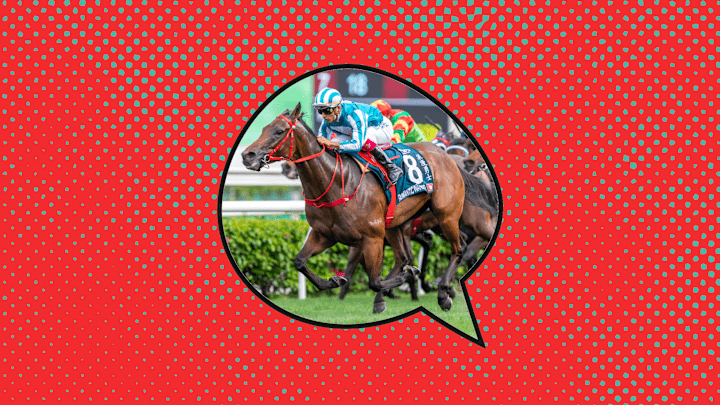The English language is full of common phrases coined so long ago that their original—often literal—meanings have long been forgotten. Gear up for this year’s Kentucky Derby on May 7 with 12 everyday utterances that came straight from the horse races.
1. Across the Board
Before across the board referred to everything in a given category, it was used to describe a bet in which you chose one horse and put equal sums of money into all three possible lucrative outcomes: winning (first place), placing (first or second place), and showing (first, second, or third place). Since bookies kept track of odds on blackboards back in the early 20th century, this type of wager meant you were literally selecting all the options across the board.
2. Give-and-Take

As far back as the late 1760s, a “give and take plate” was the prize for a race in which the playing field was evened by having taller horses carry extra weight. By the late 1770s, people had already started using it to describe other situations that called for compromise and fair exchange. The first known mention of this broader sense comes from Frances Burney’s 1778 novel Evelina: “give and take is fair in all nations.”
3. Hands Down
These days, hands down usually means “indisputably” or “effortlessly.” When it originated in the 19th century, the phrase specifically described a horse race that was won indisputably or effortlessly—so much so that the jockey would slacken the reins and cross the finish line “with hands down.”
4. Run for Your Money

If you were a 19th-century race-goer backing a certain horse, you wanted to get a run for your money—preferably a profitable one, but any run was better than no run. After all, there’s always a chance that a horse can get withdrawn from the lineup (or “scratched”) at the last minute because of injury, illness, subpar racing conditions, or any number of other reasons. Before long, people started using a run for one’s money outside the racetrack in scenarios where someone or something proves to be a worthy competitor.
5. and 6. Under the Wire and Down to the Wire
Because a wire was sometimes hung above the finish line so judges could more easily identify the winning horses, people started calling the finish line “the wire” around the 1870s. If you said a horse came in under the wire, you just meant that they crossed the finish line; and if you said two horses raced down to the wire, you meant that they ended the race in close competition. Probably owing to the dramatic and last-minute nature of horse racing in general, under the wire and down to the wire both came to describe something finished or accomplished at the last possible minute.
7. and 8. Home Stretch and Home Straight
If you assumed this entry began as baseball slang, you’re probably not alone—it makes sense that the last segment of the diamond, from third base to home plate, would be called the “home stretch” or “home straight.” But it was originally used in horse racing: It’s the last (straight) leg of the track between the final corner and the finish line. These days, the final push before the end of anything—a trip, project, etc.—can be a home stretch.
9. Jockey for Position

Jockeying for position just means you’re trying to move into a better position—maybe for a better view at a concert, or for a clearer path to the finish line in an actual race. The origins of the phrase may seem obvious, since jockeys angle for better positioning during today’s horse races. But its history is a little more complicated than that, because the word jockey didn’t always just refer to racehorse riders. It also described horse dealers, who had a reputation for cheating, making crooked deals, and generally being untrustworthy.
So people started using jockey as a verb that basically meant “to gain an advantage over someone by tricking them” or “to get something by cheating or outwitting someone.” According to the Oxford English Dictionary, it was this sense that gave rise to the phrase jockey for position. In other words, if you nabbed a better position, the implication was once that you got there on the backs of those less cunning or more moralistic than you.
10. Neck and Neck
Neck and neck originally described well-matched horses who didn’t pull ahead of each other during a race: Their necks stayed even. The earliest known written instance of the phrase with regard to horses is from 1799, and it almost immediately got co-opted for other types of races—specifically political ones. “The contest for Kent is the keenest that has yet been run. The three candidates are neck and neck,” The Morning Post reported in July 1802.
11. Win by a Nose

Thanks to those aforementioned long necks, horses’ noses often cross the finish line before their legs. If the first-place finisher in a 19th-century horse race eked out a win by a tiny margin, they quite literally only won by a nose. Today, any kind of close victory can be described as being won by a nose.
12. Fast Track
In the mid-19th century, per the OED, a fast track was “a racetrack with a hard dry surface which enables horses to run at high speed.” A slow track was the exact opposite: one with a “soft wet surface.” Though slow track did catch on as a metaphorical phrase, fast track is the more popular of the two, hands down. Today, a fast track can be any accelerated path, literal or figurative; it’s even been turned into a verb. Fast-track that report of most hated business jargon, please.
